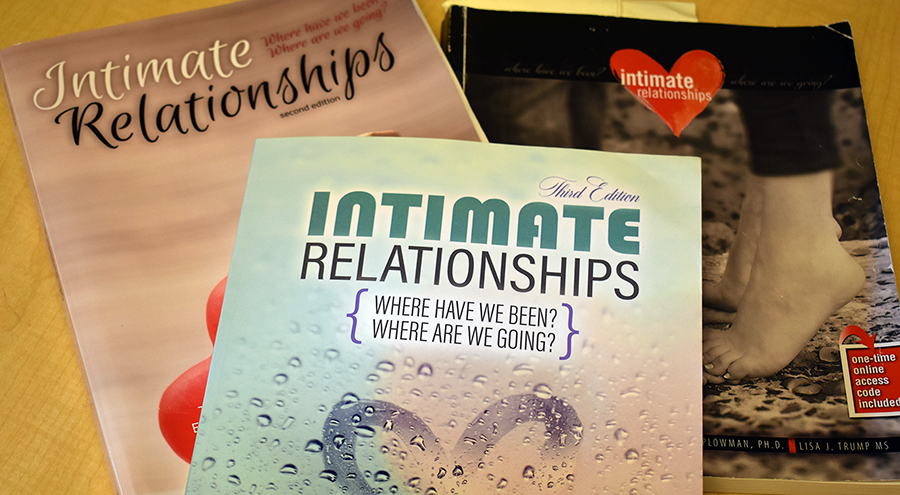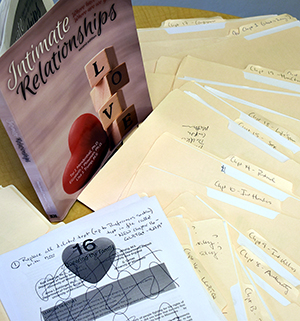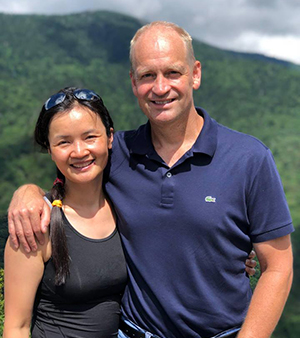
The third edition of the textbook, Intimate Relationships: Where have we been? Where are we going?, marries science and story to help undergraduates understand the complexity of today’s modern intimate relationships. The lead author is Dr. Tai Mendenhall, associate professor of Family Social Science, who collaborated with undergraduate and graduate students to create a text that did not previously exist in the marketplace. Their efforts over the past six years have resulted in a book that uniquely combines real student stories with rigorous research to enrich (inter)personal growth and learning.
He launched the textbook project to accompany the popular University of Minnesota course called Intimate Relationships. Having been a teaching assistant for its original instructor and creator, Dr. Wayne Caron, Mendenhall took over the Family Social Science (FSOS) course following Caron’s sudden death just days before the start of the fall 2007 semester. Mendenhall’s leadership in the class received such positive feedback from students that the original single-semester contract turned into an ongoing assignment.
Unfortunately, the textbook for the class wasn’t so warmly reviewed.
“Student feedback for the first couple of semesters was: ‘love the class, hate the textbook’,” says Mendenhall. He experimented with several books over the course of the next few years, but the search for a book that was equal to the energy of in-class lectures and discussions was fruitless. So, he finally decided to just write a new one. Mendenhall launched a semester-long series of discussions with former and current students to determine what an effective textbook would look like. He also engaged with then-FSoS graduate students who were TAs in the class, Elizabeth Plowman and Lisa Trump. They later became his co-editors.
“I suppose I could have done the book in a ‘world according to Tai’ way – but the world is bigger than that,” says Mendenhall. “We brought back students who had taken the class before. I did an ‘alter call’ in our current class. Our goal was to integrate professional expertise with community – students’ – lived experiences, wisdom, and expertise.”
This method of inquiry represents a process called Community-based Participatory Research (CBPR). Mendenhall had used this approach in his University research agenda to great effect, but never before with his teaching – that is, until he and his students embarked upon writing this book.
“CBPR develops health interventions ‘with’ a community, not ‘on’ them,” he emphasizes. One example is his project that brought together American Indian community members and UMN public health professionals and researchers to better understand and reduce health disparities in diabetes. The ongoing East Metro American Indian Diabetes Initiative was honored in 2017 with a Ramsey County Public Health Award.
Featuring contributions from both undergraduates and Family Social Science graduate students, the first edition of the textbook was published in 2014 by Kendall Hunt Publishing Company. Mendenhall and his co-editors acknowledged in the introduction that the book, like intimacy, is “a journey now beginning, always evolving…” and he considered it a “dry run” for a more ambitious second edition.
“We used the first edition for four semesters (2 years), all-the-while collecting feedback (over 1,000 emails) and revising the text,” says Mendenhall. The second edition was published in 2016, and although not widely marketed, Miami University (Ohio) picked it up for use in a family development class, as did a Twin Cities high school.
For the third edition, Mendenhall, Plowman, and Trump took the book apart – literally – chapter by chapter.

Mendenhall says the third edition went through an editing process lasting well over a year as he and his co-editors juggled complicated schedules and extensive meetings. Plowman is now based in Chicago, where she teaches at American University and American Military University. Trump is with the University of St. Thomas faculty as an adjunct.
For the third edition, graduate and undergraduate students were even more involved in writing and revisions. Some methodically combed the book for every typo and out-of-place comma, and gave feedback on positioning of tables/graphics, etc. Others contributed personal stories (anonymously and credited) to introductory case studies and end-of-chapter conclusions. Two advanced undergraduate students even lead the effort to co-author a re-write of the chapter on LBGTQ+ relationships.
Mendenhall, Plowman, and Trump then integrated all of these diverse points of view – bringing together a cohesive tone and voice to the textbook while, at the same time, ensuring that its rigor and research matched the authenticity of the stories it tells.
“What I love about the book is that students see themselves in it,” says Mendenhall. “Every chapter begins and ends with a story from students about their personal and/or family journeys related to whatever ‘objective’ content we are teaching. It takes vulnerability, courage, and maturity to be able to do that.”
Dr. Jane Newell, a FSoS alumna, University of New Mexico family studies faculty member, and book contributor, wrote in the forward to the first edition that “It is very exciting for me to witness the birth of this textbook: a creation that mirrors Dr. Mendenhall’s teaching philosophy and methodology. And more than that, it exemplifies his dedicated mentorship style.”
A survey that Newell conducted showed that 80 percent of students became more empowered and mindful of their relationships after taking the course. The number one reason? Mendenhall’s teaching style – a style that credits “students as co-creators of knowledge, honors their lived experiences, advances relevant content and encourages self-focus, self-reflection, and self-care.”

For Mendenhall, “There is nothing that means more to me in my work as a faculty member than our students.” He credits Caron’s inspiration and mentorship for helping him to grow as a teacher, and says he still “feels him sitting in the back row of class – every day.”



